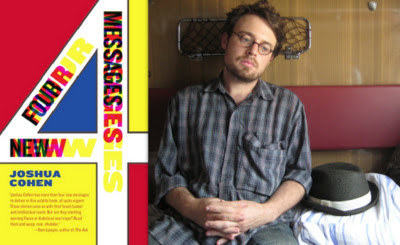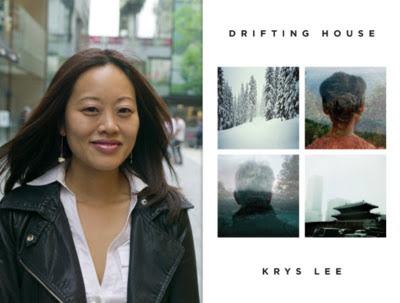By Patrick Thomas Henry
On Jan. 11, readers escaped Manhattan’s rain-dowsed Union Square for an evening celebrating the contemporary short story. The event, at The Strand bookstore, paired Deborah Eisenberg and George Saunders for a reading and a discussion moderated by Newsweek/ Daily Beast books editor Lucas Wittmann. The event’s cover charge was the purchase of Saunders’ newest collection Tenth of December, Eisenberg’s The Collected Stories of Deborah Eisenberg, or a ten-dollar Strand gift card—but the buzz among the sold-out crowd was that buying either book was a better deal than the gift card. The readings and discussion were held on an elevated dais at the rear of the Strand's rare books room, where shelves of collectible volumes served as a backdrop for the night’s conversation.
Eisenberg’ and Saunders’ accomplishments rank them among the top writers specializing in the short story. Eisenberg, among other accolades, has received a Guggenheim Fellowship, a MacArthur Fellowship, and the 2011 PEN/Faulkner Award for The Collected Stories of Deborah Eisenberg. She taught in the University of Virginia’s MFA program from 1994 to 2011 and now teaches at Columbia University. Saunders, also a MacArthur Fellow, was recently the subject of Joel Lovell’s New York Times Sunday Magazine cover story “George Saunders Has Written the Best Book You’ll Read This Year.” Saunders’ first book, CivilWarLand in Bad Decline, was a finalist for the PEN/Hemingway Award, and his collection In Persuasion Nation was a finalist for The Story Prize. Saunders has been a member of the graduate writing program faculty at Syracuse University since 1997.
Saunders read from “Home,” a short story from Tenth of December. In “Home,” a traumatized veteran finds his family and community in disarray. The story’s narrator cannot interpret the transformations in his town and personal life, and he eventually admits, in typical Saunders fashion, “I started feeling like a chump, like I was being held down by a bunch of guys so another guy could come over and put his New Age fist up my ass while explaining that having his fist up my ass was far from his first choice and was actually making him feel conflicted.”
Eisenberg then read an excerpt from “Revenge of the Dinosaurs,” first collected in Twilight of the Superheroes. In this story, the protagonist, Lulu, returns to the East Coast after her Nana suffered a disabling stroke, and Lulu’s miscommunications with her brother Bill lead to vocal clashes over Nana’s care. As a backdrop to Lulu and Bill’s vitriolic exchanges, Nana—rendered mute from her stroke—incessantly watches the black-and-white television’s shifty, grainy images, a resonant metaphor for the muddled conversations that govern our lives.
In response to these readings, Lucas Wittmann observed that each writer eloquently captured the inexpressive and inarticulate qualities of everyday speech. This interpretation of their work initiated a discussion on writing and teaching short fiction. Eisenberg and Saunders described how their work correlates to lived experiences and, furthermore, to teaching MFA students to sincerely depict their surroundings. Wittmann, invoking the footage of war protests in “Revenge of the Dinosaurs” and the recently discharged veteran in “Home,” asked the authors to place their stories in the context of recent political events. Eisenberg responded, after Wittmann queried her about the recently averted fiscal cliff and the crumbling vision of the American middle class. “One assumed there would always be a middle class. But now, to see it eroded and to see ourselves on this planetary cliff for everything—it couldn’t be more terrifying and riveting,” said Eisenberg.
Eisenberg’s remarks suggested that the writer’s task is to express the intrinsic—and simultaneous—beauty and terror of our ever-shifting reality. Yet, both she and Saunders cautioned students against giving ideology priority because that approach can crowd out characters and genuine sentiments. These emotions, they argued, welcome the reader into a story’s fictionalized world. For this reason, Saunders commented that he often teaches Eisenberg’s Twilight of the Superheroes to his MFA students because of the collection’s “intelligent surface and overall charm.” For Saunders, the “charm offensive” of Eisenberg’s stories is effective because her prose explores the dramatic tension between characters and their circumstances, so that the larger ideas arise from the characters’ behaviors. When an author crafts a story in this way, Saunders claims, the ensuing symbols, tropes, and metaphors that convey a narrative’s message become “more honest, sincere.” This critical assessment could be swiveled around to accurately judge Saunders’ own stories, such as “Home,” which reveals the muddle of ideology to express the illegibility of its narrator’s circumstances at home.
Another reason to resist idea-based fiction is what Eisenberg termed the “danger of imposing rules.” Indeed, Saunders jocularly dismissed the misconception that MFA programs allow students to “receive the secrets on a silver platter.” Based on this conversation, Wittmann suggested that the purpose of an MFA program isn’t one of passing down strictures but of teaching students to read themselves and others. Eisenberg and Saunders both endorsed this mission. Yet, as both writers continued praising the short story’s compression as a means of amplifying a narrative’s clarity and momentum, I suspected that they were imparting a message as pervasive—yet easily neglected—as the shrouding mists outside The Strand. The writer’s craft must emphasize conveying sensation and emotion accurately, fairly, and evocatively—in defiance of our own worst habits. Eisenberg intimated as much when she discussed a conversion in her own writing habits: the decision to keep notebooks during the aftermath of September 11. Eisenberg said, “9/11 was a huge obstacle. I felt that things were going to start changing immediately . . . and that it would be impossible to remember accurately.” So she bucked her own methods, kept journals, and resisted the urge to soliloquize in a manner that would emphasize concepts over humanity.
What Eisenberg and Saunders imparted on a cold, rainy night is a warming sentiment: May all writers have a vision crystalline enough to remember why they write, and for whom. This hope is as pervasive in Eisenberg’s Collected Stories and Saunders’ Tenth of December, as it was at their reading at The Strand.
 |
| Stranded: Eisenberg, Wittmann, and Saunders |
Eisenberg’ and Saunders’ accomplishments rank them among the top writers specializing in the short story. Eisenberg, among other accolades, has received a Guggenheim Fellowship, a MacArthur Fellowship, and the 2011 PEN/Faulkner Award for The Collected Stories of Deborah Eisenberg. She taught in the University of Virginia’s MFA program from 1994 to 2011 and now teaches at Columbia University. Saunders, also a MacArthur Fellow, was recently the subject of Joel Lovell’s New York Times Sunday Magazine cover story “George Saunders Has Written the Best Book You’ll Read This Year.” Saunders’ first book, CivilWarLand in Bad Decline, was a finalist for the PEN/Hemingway Award, and his collection In Persuasion Nation was a finalist for The Story Prize. Saunders has been a member of the graduate writing program faculty at Syracuse University since 1997.
 |
| George Saunders |
Eisenberg then read an excerpt from “Revenge of the Dinosaurs,” first collected in Twilight of the Superheroes. In this story, the protagonist, Lulu, returns to the East Coast after her Nana suffered a disabling stroke, and Lulu’s miscommunications with her brother Bill lead to vocal clashes over Nana’s care. As a backdrop to Lulu and Bill’s vitriolic exchanges, Nana—rendered mute from her stroke—incessantly watches the black-and-white television’s shifty, grainy images, a resonant metaphor for the muddled conversations that govern our lives.
In response to these readings, Lucas Wittmann observed that each writer eloquently captured the inexpressive and inarticulate qualities of everyday speech. This interpretation of their work initiated a discussion on writing and teaching short fiction. Eisenberg and Saunders described how their work correlates to lived experiences and, furthermore, to teaching MFA students to sincerely depict their surroundings. Wittmann, invoking the footage of war protests in “Revenge of the Dinosaurs” and the recently discharged veteran in “Home,” asked the authors to place their stories in the context of recent political events. Eisenberg responded, after Wittmann queried her about the recently averted fiscal cliff and the crumbling vision of the American middle class. “One assumed there would always be a middle class. But now, to see it eroded and to see ourselves on this planetary cliff for everything—it couldn’t be more terrifying and riveting,” said Eisenberg.
 |
| Deborah Eisenberg |
Another reason to resist idea-based fiction is what Eisenberg termed the “danger of imposing rules.” Indeed, Saunders jocularly dismissed the misconception that MFA programs allow students to “receive the secrets on a silver platter.” Based on this conversation, Wittmann suggested that the purpose of an MFA program isn’t one of passing down strictures but of teaching students to read themselves and others. Eisenberg and Saunders both endorsed this mission. Yet, as both writers continued praising the short story’s compression as a means of amplifying a narrative’s clarity and momentum, I suspected that they were imparting a message as pervasive—yet easily neglected—as the shrouding mists outside The Strand. The writer’s craft must emphasize conveying sensation and emotion accurately, fairly, and evocatively—in defiance of our own worst habits. Eisenberg intimated as much when she discussed a conversion in her own writing habits: the decision to keep notebooks during the aftermath of September 11. Eisenberg said, “9/11 was a huge obstacle. I felt that things were going to start changing immediately . . . and that it would be impossible to remember accurately.” So she bucked her own methods, kept journals, and resisted the urge to soliloquize in a manner that would emphasize concepts over humanity.
What Eisenberg and Saunders imparted on a cold, rainy night is a warming sentiment: May all writers have a vision crystalline enough to remember why they write, and for whom. This hope is as pervasive in Eisenberg’s Collected Stories and Saunders’ Tenth of December, as it was at their reading at The Strand.
















